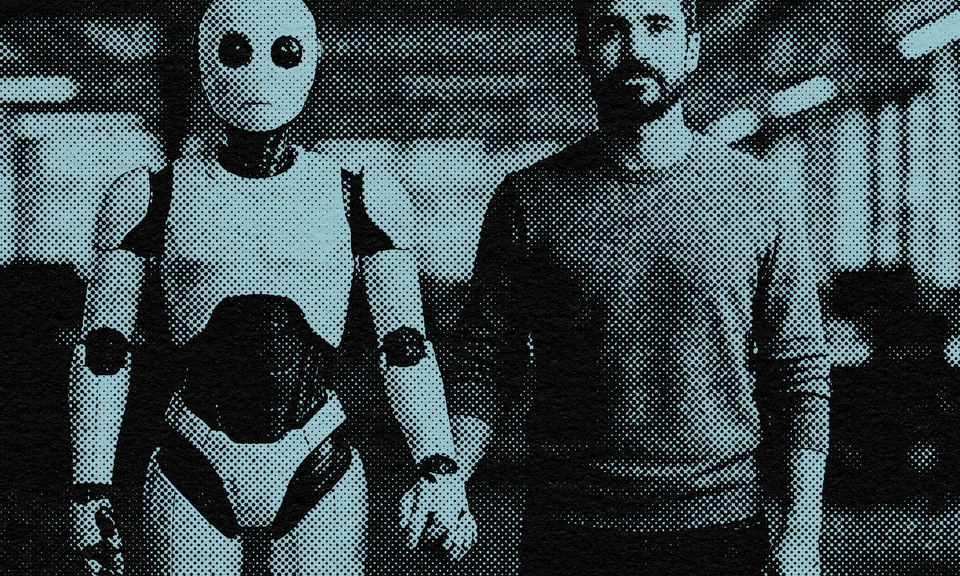Project management isn’t dead. AI just made it more human.

If you believe the headlines, AI is coming for your job. Today, it’s copywriters and designers. Tomorrow it’s the project managers. Pretty soon, a bot named ChadGPT will be running your standups and sending passive-aggressive status updates to stakeholders.
Sure. Maybe.
The robots are coming.
But they’re not coming for you. They’re coming to help you.
Before you panic, get curious. That’s what I did. (If you’ve read Project Management for Humans, you know I’m a big believer that curiosity is a required trait for any good PM. At least, that’s what I say. ;))
These days, I don’t manage projects. I split my time between leading people operations at Image Conscious Studios and building leadership training and resources through Same Team Partners. Project management is still baked into everything I do.
When the AI panic hit, I didn’t freak out. I got curious. So, I did what any recovering project manager would do: I over-researched it. I tested tools. I tried prompts. I sat through free online classes. I read a small mountain of articles. And no, I did not find a robot who could do my job better than I could.
What I found was something way more useful: a new toolset. A smarter way to clear the crap off my plate. And a blunt reminder that if you want to stay relevant in project management—or leadership of any kind—you have to embrace the tech and double down on being an actual human.
Because the future of project management isn’t about automating everything. It’s about remembering why the human part mattered in the first place.
Project management has always been about people, not just tasks
If you’ve ever sat through a standup where someone reads tickets out loud like they’re reciting ancient scrolls, you already know: project management without emotional intelligence is just... administration.
People don’t want to be treated like deliverables. They want to be led by someone who gets the work and gets them.
Good project management isn’t about controlling tasks. It’s about creating the environment where good work actually happens. It’s about building trust, making it safe to take risks, and making sure people feel like part of something real, not just cogs in a machine.
That’s where empathy comes in. And no, empathy doesn’t mean handing out gold stars, being "nice," or pretending every problem can be fixed with a vibe check. Empathy is a strategy. It’s recognizing that a missed deadline might mean someone’s overwhelmed, not incompetent. It’s knowing when to dig in and when to back off. It’s being human enough to care and smart enough to act on it.
Real empathy doesn’t start with a checklist. It starts with showing up like an actual human—awkward, imperfect, and willing to listen. So, you have to do the things that show you're an actual human being, not an annoying pop-up notification. Admit when you don’t know something. Listen like you mean it. Pay attention to the invisible work that keeps teams afloat. And before you escalate a late task, ask yourself if maybe—just maybe—there’s a bigger story behind it.
Because in the future, the best PMs won’t be the ones who check off the most tasks.
They’ll be the ones people trust to lead them through the messy, human parts of the work—the parts no AI will ever understand.
AI isn’t a thinker. It’s a helper.
Here’s the real revelation after playing with every shiny AI tool I could find: AI isn’t coming for your job. It’s just here to make your job a little less soul-sucking.
Think of it like an intern who shows up every day, ready to help, but knows absolutely nothing unless you tell them precisely what to do, in the simplest language possible. No nuance. No intuition. No "reading between the lines."
Training AI is weirdly efficient. It's short. It's direct. It's transactional. Frankly, I think this is why it freaks people out, because it highlights just how much "real work" isn't about the task. It's about the people.
And while AI can absolutely help you move faster through the admin swamp, it still can't think for you. It can't anticipate that a stakeholder is about to nuke your timeline. It can't catch the eye roll in a Zoom call. It can't tell you why a perfectly reasonable plan will land like a lead balloon with a burned-out team.
It can only do what you tell it—no more, no less.
Which is why the future belongs to PMs who treat AI like a tool, not a replacement.
Where AI shines (and where it falls flat)
I’ve seen quite a few project managers using AI tools recently for many PM tasks. Some of it’s great. It’s faster, cleaner, and takes a lot of admin work off their plates.
But it’s not magic. It’s not perfect. It never will be.
At its best, AI helps you start faster. It clears space so you can show up better for your team. At its worst, it gives you a false sense of security, like everything’s handled when you haven’t actually done the human work yet.
Here’s where AI actually pulls its weight and where it still needs you to finish the job:
Meeting summaries: Using AI for meeting notes seems to be where most PMs claim their time back and find ways to improve their presence in meetings by facilitating rather than scribing. This makes me so happy, because being on the hook to take perfect meeting notes in a room full of fast-talking, smart people is a daunting task! I would have killed for this in 2010!
AI tools like Otter.ai and Fireflies can turn online meeting transcripts into tight action-item lists. That means you can actually be in the meeting, not just document it.
Project plan drafts: With the right prompts, ChatGPT or Notion AI can give you a solid first-pass project plan—phases, milestones, risks, assumptions. It’s not perfect, but it beats starting at a blinking cursor. Personally, I'm not a fan of creating plans with AI, but if you're a busy PM (or someone being forced to play PM)and you need a tool to get you started, I can see this as an option for you.
Polishing communications: Status updates, stakeholder emails, project briefs, etc. AI can tighten and clarify language so you don’t waste an hour obsessing over tone.
Rough resource/timeline estimates: Need a quick, ballpark timeline? AI can sketch it out faster than you can open another spreadsheet. (But you’ll still need to sanity-check it.)
Agian, AI shines at starting points. It helps you skip blank pages and draft faster. But it’s your brain—and your leadership—that turns drafts into action.
On the flip side? AI falls on its face the second real nuance enters the room. It doesn’t know when someone’s faking agreement. It doesn’t catch tension in a Slack thread. It doesn’t intuit politics, burnout, or morale.
And it never will.
Tactical AI prompts and tools worth trying
I’ve played around with a lot of AI prompts—mostly for fun, research, and a little bit of "can it really do that?" curiosity. I haven’t delivered real projects this way (yet), but I’ve learned a lot about where these tools can actually make your life easier.
If you want to test AI the smart way, start here:
Meeting summaries
"Summarize this meeting into 5 bullet points, focusing on action items, deadlines, and owners."
Tool: Fathom, Zoom AI, Otter.ai (and so many more)
Project plan starter
"Create a 6-week launch plan for a new website. Include key phases, milestones, major risks, and assumptions."
Tool: ChatGPT, Notion AI (and many products are updating their UI to include AI options. Don't worry, you'll find out through 400 annoying pop-up notifications when it's released.)
Stakeholder update rewrite
"Rewrite this project update to sound confident, reassuring, and proactive, keeping it under 150 words."
Tool: ChatGPT
Rough resource/timeline estimate
"Estimate the resources and time needed for a four-person team to build a mobile app MVP, assuming a 10% buffer for unexpected delays."
Tool: ChatGPT, OnePlan
I pulled these examples from a lot of trial and error—and no, AI still isn’t magic. It can save you time, but only if you know how to use it. A half-baked prompt will get you a half-baked answer. And even the best AI outputs still need a human brain (yours) to refine, rethink, and reality-check them before they ever hit a real project plan.
If you want even more inspiration, check out Every.to’s AI newsletter or Ethan Mollick’s Substack. Both are great if you want to stay sharp without falling into AI hype cycles.
And since we’re talking about making AI actually useful, here’s how to write prompts that don’t waste your time:
Tips for writing better AI prompts for project management tasks:
- Be absurdly specific. Tell it exactly what you need: the task, the format, the audience, the tone, the level of detail. (“Summarize this meeting for a team of senior engineers who hate bullet points.”)
- Provide real context. What kind of project is it? What’s the timeline? What’s the mood? The more breadcrumbs you drop, the better the response.
- Ask for formatting. Want a table? Action items? Risk flags? Tell it. Otherwise, you’ll get a wall of text that still needs heavy lifting. Or worse, a document full of emoji bookended by em dashes.
- Assume you’ll edit. Always. Every output is a starting point, not a final product. Remember, your leadership and your judgment still matter most.
The goal isn’t to get AI to think for you. The goal is to get it to work for you, so you have more time and energy to lead the way only a real human can.
Don’t let AI trick you into giving up what matters most
AI will make you feel faster. Slicker. Smarter. And then—if you’re not careful—it’ll make you lazy.
Because AI will never hand you a final, finished product, every meeting summary, project plan, and stakeholder update it spits out will still need human eyes, instincts, and judgment layered on top.
Remember: You can’t automate trust. You can’t outsource leadership. You can’t prompt your way to psychological safety.
Every AI shortcut comes with a catch: you still have to lead. And if you’re not showing up for the complex, human parts, you’re not really leading. You’re just project managing yourself into obsolescence.
The real future of project management
AI is already changing project management. But it's not replacing PMs—it's exposing them.
If you were just moving tasks around before? Yeah, AI might make you nervous.
But if you were leading, supporting, and building trust? Congratulations. You just got a new assistant.
The PMs who will thrive are the ones who use AI to move faster and use their emotional intelligence to lead better. They'll automate what doesn’t matter and pour more into what does.
The future isn’t faster workflows and prettier dashboards. The future is smarter, braver, and more human leadership. So learn the tools, stay curious, and lead like a human—because no one has ever been inspired by a perfectly optimized Gantt chart.
TL;DR:
You’re not being replaced. You’re being revealed. AI might make you faster, but emotional intelligence is what makes you better, and it always will. The PMs who will thrive aren’t the ones who automate every last update and call it leadership. They’re the ones who show up when it actually matters. So stay curious. Test the tools. Find the right fit. Lead boldly. And stay human


Member discussion